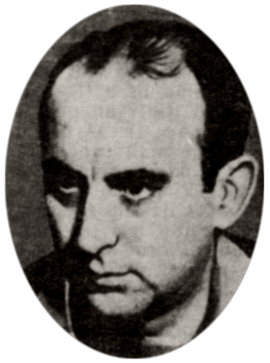Lucian Raicu | |
|---|---|
 Raicu c. 1976 | |
| Born | Bernard Leibovici 12 May 1934 Iași, Kingdom of Romania |
| Died | 22 November 2006 (aged 72) Paris, France |
| Occupation | Journalist, critic |
| Period | 1950–c. 2000 |
| Genre | |
| Literary movement | |
Lucian Raicu (pen name of Bernard Leibovici; 12 May 1934 – 22 November 2006) was a Romanian literary critic, biographer, memoirist, and magazine editor, who was the brother of novelist Virgil Duda and the husband of writer Sonia Larian. As a Jewish youth growing up in Bârlad, he was drawn into leftist causes shortly after World War II, and was accepted into the Romanian Communist Party. Upon the inauguration of a communist regime in 1948, he trained at the Eminescu School of Literature in Bucharest, and, before the age of twenty, was drafted into the new cultural establishment. As a staff critic at Viața Romînească, he initially pledged himself to Socialist Realism, and supervised the literary scene for ideological conformity, falling in line with the censorship apparatus. More privately, Raicu was embracing dissident stances and questioning the standards of Marxist literary criticism; alongside friends such as Nicolae Labiș and Paul Goma, he began reading banned works by Romanian and French authors. His professionalization was effected in 1958, upon his graduation from the University of Bucharest.
Encouraged by the promise of de-Stalinization in the late 1950s, Raicu was openly challenging the communist literary establishment with articles which spoke about the primacy of aesthetic over political values. Alongside Goma, Labiș and Larian, he participated in the 1956 youth protest movement, though Securitate agents never managed to implicate him directly, and had to rely on suspicions. He and his wife were still caught up in the backlash, and left unemployed after Raicu refused to perform self-criticism. They were partly rehabilitated in the 1960s, but were by then on their way to becoming fully anti-communist. As a columnist at România Literară, Raicu embraced a "phenomenological" overview which cultivated pluralism, close reading, and a full-on rejection of formalism. He was widely celebrated in the literary community, especially after publishing highly original monographs on Liviu Rebreanu (1967), Nikolai Gogol (1974) and Labiș (1977), being seen as a companion of younger liberal critics—such as Mircea Iorgulescu, Nicolae Manolescu, and Eugen Simion. Raicu also came into implicit, and then explicit, conflict with the official strictures imposed by national-communism, rejecting its "July Theses". He was a first-hand witness to the death of his novelist friend, Marin Preda; this mysterious incident, alongside other poorly-explained deaths in his personal circle, and a general disgust with the national-communist regime, eventually forced him into near-complete isolation and silence.
After a series of efforts, the Raicus were finally reissued Romanian passports in late 1986, allowing them to receive a scholarship in Paris; they never returned from their trip. Lucian Raicu tried to rebuild his career as a critic in France, but was largely ignored by its literary establishment—excepting an encouraging review by Michel Crépu. Focusing his attention on Eugène Ionesco, who became the main topic of his literary diary, he was also a participant in the anti-communist movement of exiles, alongside Goma and Dorin Tudoran. He welcomed the Romanian Revolution in December 1989, but was again jaded after the political violence of June 1990, which cemented his resolve about not returning to his homeland. Making selective broadcasts over Radio France Internationale, and penning a number of memoirs, he spent his final decade incapacitated by disease, and became fully isolated in his Parisian home. He ultimately died anonymously in a French hospital, being survived by his widow and his brother (the latter of whom had settled in Israel).